Western allies impose sanctions on Russia, as Putin gets the green light to deploy troops to breakaway republics
Western allies imposed a raft of sanctions against Russia on Tuesday, in response to Russian recognition of two breakaway republics in the east of Ukraine.
 ADVERTISEMENT
ADVERTISEMENT
 ADVERTISEMENT
ADVERTISEMENT
Britain unveiled a "first tranche" of sanctions against Russian entities and individuals on Tuesday, with the EU announcing its own sanctions targeting economic, political, military, business and media sectors.
Meanwhile Germany said it is halting certification of the Nord Stream 2 gas pipeline, a vital energy connection for Russia, as US President Joe Biden announced a new round of American sanctions against Russian oligarchs and banks.
Follow all of Tuesday's key developments here:

 ${title}
${title}
Live ended
The key points to know
- Russian President Vladimir Putin on Monday night recognised the independence of the so-called Donestk People's Republic and Luhansk People's Republic — two separatist-held areas in eastern Ukraine.
- He signed a decree to dispatch Russian troops for "peacekeeping functions" in the regions.
- Ukrainian President Volodymyr Zelenskyy told the nation in a televised address: "We are not afraid of anyone or anything".
- The UK and EU announced a raft of sanctions against economic, political, military, business and media sectors.
- President Biden says the US will redeploy some US troops in the region, and target Russian finances with sanctions.
- Germany is halting certification of Nord Stream 2 gas pipeline, a vital energy connection for Russia.
- The EU says it has prepared contingency plans in case of an exodus of refugees from Ukraine.
President Biden announces sanctions against Russian oligarchs and banks
US President Joe Biden announced the US was ordering heavy financial sanctions against Russian banks and oligarchs on Tuesday, declaring that Moscow had flagrantly violated international law by invading Ukraine.
“None of us will be fooled” by Russian President Vladimir Putin's claims about Ukraine, the US President said. And he said more sanctions could be on the way if Putin proceeds further.
Biden said he was also moving additional American troops to the Baltic states on NATO’s eastern flank bordering Russia.
President Biden joined the 27 European Union members who unanimously agreed on Tuesday to levy their own initial set of sanctions targeting Russian officials over their actions in Ukraine.
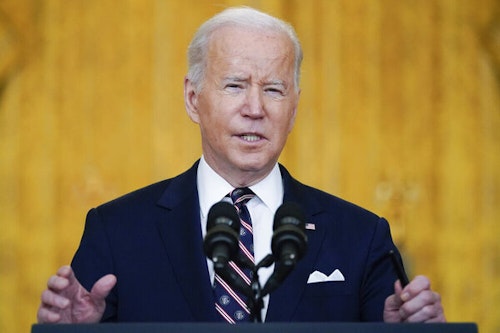
Ukraine's Defence Minister in Washington for talks with US Administration
Austin told Kuleba it was an honor to meet with him at "this critical, critical moment in history" and that "Russia's latest invasion is threatening the peace, security and prosperity of Ukraine and of the transatlantic community."
"I'm looking forward to discussing with you the continuation of our partnership", and a "strong Ukraine is the best deterrence of Russia" he said.
The Biden administration was initially hesitating to use the term "invasion" - a red line that President Joe Biden has said would result in the US levying severe sanctions against Moscow. However on Tuesday Jon Finer, the principal deputy national security adviser, said "We think this is, yes, the beginning of an invasion, Russia's latest invasion into Ukraine."
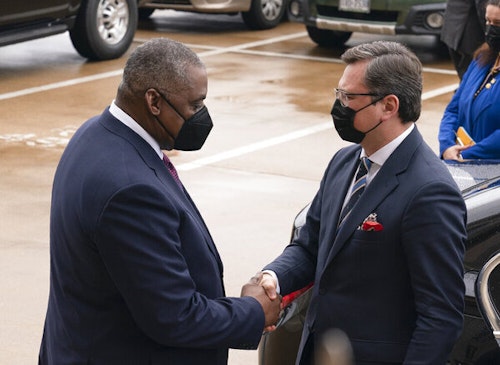
Northern Europe 'Joint Expeditionary Force' members meet to discuss regional security situation
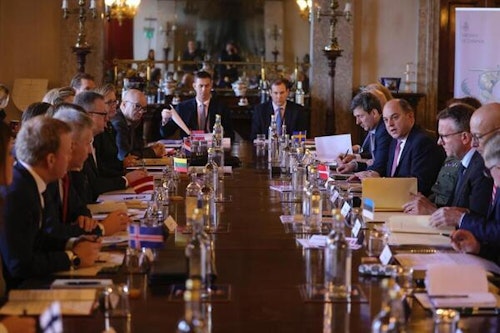
Poland says heavy sanctions should be inflicted on Russia
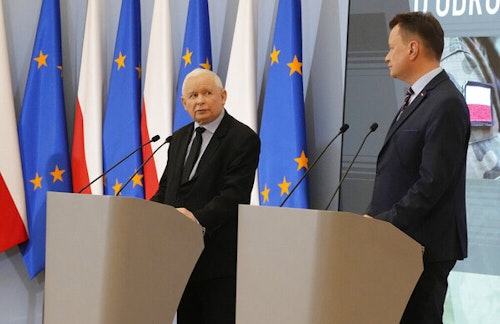
Russia announces evacuation of diplomatic staff from Ukraine
EU making contingency plans to cope with any influx of refugees from Ukraine
The European Union is getting ready to take in refugees from Ukraine, as fears grow that Russia's military aggression could soon cause a wave of migrants seeking shelter in EU countries.
Poland, a neighbouring country, has said it is willing to host them.
Speaking to Euronews from Warsaw, Ylva Johansson, the European Commissioner for home affairs, said contingency plans are already in place.
"The focus has been on the contingency planning for the very dangerous situation in Ukraine. We don't know what would be the next step of Putin, but we have to be prepared if there will be a massive inflow of refugees of Ukrainians into the European Union. And Poland is, of course, a key country here," she said.
"We are looking into the support from the EU asylum agency with processing asylum applications, the support from Frontex with registration and border management, and the support from Europol as well."
Johansson avoided giving figures on how many asylum-seekers the bloc was expecting in case of a military invasion but stressed the EU's unity was "very strong and determined."
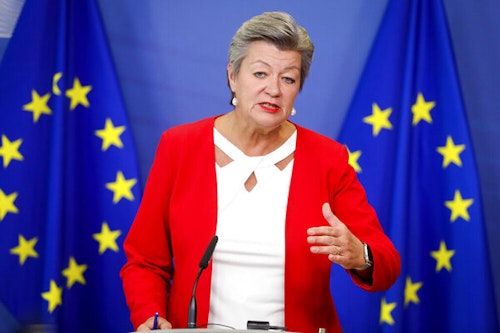
Russia 'continues to plan for a full-scale attack on Ukraine', NATO chief says
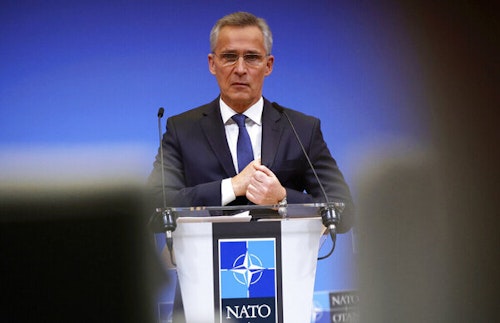
Hungary to deploy military to region near Ukrainian border
Hungary's defense minister says the military will deploy soldiers and equipment to the region near the Ukrainian border to prepare for potential humanitarian and border protection operations.
Defense Minister Tibor Benko said Prime Minister Viktor Orban ordered the military to mobilise along the country’s eastern border to prevent armed groups from potentially entering Hungarian territory, Hungarian state news agency MTI reported.
Benko said that he believed further escalation of the conflict between Russia and Ukraine could bring armed activity all the way to Ukraine's western border. He said Hungarian soldiers would need to be prepared for the possible arrival of Ukrainian refugees in the wake of a greater conflict.
Energy prices surge as Ukraine crisis deepens
President Biden to give live update on Ukraine-Russia situation
Lawmakers give Putin permission to use force outside Russia
Russian lawmakers have given President Vladimir Putin permission to use military force outside the country.
The unanimous vote in Russia's upper house on Tuesday afternoon could presage a broader attack on Ukraine after the US said an invasion was already underway there.
The vote formalizes a Russian military deployment to the rebel regions, where an eight-year conflict has killed nearly 14,000 people.
Several European leaders said earlier in the day that Russian troops have moved into rebel-held areas in eastern Ukraine after Putin recognised their independence.
But it was unclear how large the movements were. Ukraine and its Western allies have long said Russian troops are fighting in the region. Moscow denies those allegations.
Thermal power plants catch fire in Luhansk region due to shelling, Ukrainian authorities say
Russian official says Europeans will pay more for natural gas without Nord Stream 2
But experts have said that stopping the certification process for the gas pipeline doesn't necessarily imply there will be less Russian gas sent to Europe.
"Gas trade can continue along the traditional routes, among which also feature Nord Stream 1," Simone Tagliapietra, a senior fellow at Bruegel told Euronews.
"If Russia reacts to this decision by halting gas supplies, that would be a deliberate political decision, certainly not grounded in physical infrastructure considerations."
US welcomes announcement on Nord Stream 2
Russia not preparing to 'reconstitute an empire': Putin
He said Ukraine was in a "different situation" because "the territory of this country is used by third countries to create threats to Russia".
Pressure grows on UEFA to relocate Champions League final out of Russia
Britain slaps sanctions on 5 Russian banks and three oligarchs
UK and Austria summon Russian ambassadors
Von der Leyen and Michel vow to block Russia from EU markets
European Commission President Ursula von der Leyen and European Council President Charles Michel gave a preview of the new package of EU sanctions against what they call Russia's “illegal and unacceptable” recognition of Donetsk and Luhansk as independent.
The sanctions will target those involved in the recognition and punish “banks that are financing Russian military” operations in the separatist territories, the EU leaders said in a joint statement.
The package will aim to cripple “the ability of the Russian state and government to access the EU's capital and financial markets and services” in order to cut off additional funding to bankroll “escalatory policies.”
Von der Leyen and Michel also said the new sanctions will limit the trade between the bloc and the two breakaway regions “to ensure that those responsible clearly feel the economic consequences of their illegal and aggressive actions.”
“We stand by and will continue to support Ukraine and its people,” the presidents added.
Finland does not see increase in Russian military activity in Baltics
He said he doesn't see Finland facing a military threat from Russia. The two countries share a long border.
Niinisto said he didn’t know why Russia has “now simply decided to settle the Ukraine situation that has been going on for some seven, eight years.”
EU ambassadors agree to move quickly on sanctions
EU ambassadors discussed a fresh package of EU sanctions in response to the Russian recognition of the separatist republics of Donetsk and Luhansk.
The representatives agreed to move fast with the package's adoption, which is expected to be green-lighted later today by EU foreign affairs ministers in Paris.
The Hungarian ambassador expressed caution and underlined the need for dialogue but did not oppose the measures, Euronews understands.
Eric Mamer, the European Commission's chief spokesperson. said the executive presented member states with a “forceful” package of sanctions against “those involved in this illegal act” of recognition, but refused to provide details until the final list is officially approved.
Mamer rejected the characterisation of the sanctions as “targeted,” as reported by some media outlets, and said the new measures will not be a mere “mirror” of the punitive actions the bloc took against Russia back in 2014 after the Crimea annexation.
Germany suspends certification of Nord Stream 2: Scholz
He said he asked to withdraw a key report on the security of supply.
"It sounds a bit technocratic but this is the first necessary step to make sure that the pipeline cannot be certified at this time," Scholz said.
What kind of sanctions could the EU slap on Russia?
Russian MPs approve Putin's agreement with separatist leaders
Zelenskyy demands 'immediate' halt to Nord Stream 2 pipeline
Protecting population must be 'top priority': Amnesty
"We call on all parties to strictly respect international humanitarian and human rights law. They must ensure the protection of civilian lives and refrain from indiscriminate attacks and the use of prohibited weapons such as cluster bombs. We also call on them to allow and facilitate access for humanitarian agencies to provide assistance to civilians affected by the fighting," the NGO added.
UK to impose 'immediate package of international sanctions': Johnson
Putin bent on 'full-scale invasion of Ukraine': Johnson
'We must act quickly' on sanctions, Borrell says
Speech by Kenya's ambassador to the UN goes viral
China calls for 'restraint' and 'peaceful talks'
'The invasion of Ukraine has begun': UK Minister
Financial markets spooked by crisis
Ukraine's borders 'will remain unchangeable': Kyiv's ambassador to UN
What Putin said in his speech
Russia 'always for the use of diplomacy': Spokeswoman
Putin 'tore Minsk agreements to shreds': US ambassador to UN
EU chief speaks to Zelenskyy
Australia evacuates diplomats to Poland and Romania
"Due to the increased risk, Australian officials have been directed to depart Ukraine. Our Embassy and operations in Lviv are now temporarily closed. Australian officials have been deployed to eastern Poland and Romania to assist Australians seeking to depart Ukraine," she added.
Western response to 'define us for the generations to come': Lithuanian PM
Residents of separatist-held areas can evacuate to controlled Ukraine: Kyiv
Russia's UN ambassador accuses West of egging Ukraine towards conflict
“So it has become clear that Donbas is on the brink of a new Ukrainian military adventure as was already the case in 2014 and 2015,” he said.
Nebenzia said Russia was open to diplomacy but wouldn't allow “a new bloodbath in the Donbas,” urging the United States and other Western nations to not worsen the situation.
US imposes 'costs' on DPR and LPR
- new investment in the so-called DPR or LPR by a US person;
- the importation into the US of any goods, services, or technology from the two areas'
- the exportation, reexportation, sale, or supply from the US, or by a US person of any goods, services, technology from these areas;
- any approval, financing, facilitation, or guarantee by a US person of a transaction by a foreign person where the transaction by that foreign person would be covered by these prohibitions if performed by a US person or within the US.
What Zelenskyy told the nation
"Ukraine most certainly considers these last Russian actions as the violation of the sovereignty and territorial integrity of our country. All responsibility for all the consequences connected with the decision mentioned above lies on the Russian political leadership. The recognition of independence of the occupied territories of Luhansk and Donetsk regions might mean the unilateral withdrawal of Russia from Minsk agreements."










